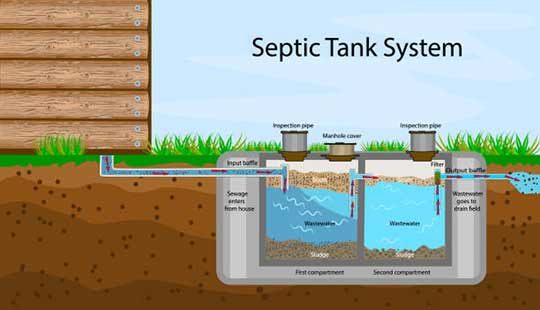
Septic systems are one of the most important systems found in rural homes and within suburban settings. They act as an intermediary between your home’s plumbing systems and the natural environment, says Jackson Management group. Septic systems ensure that your plumbing does not become a burden to nature.
By combining natural processes with technology, this system treats wastewater from your household plumbing, making the water safe to reenter the environment. Septic systems help to keep your home safe and sanitary while also preserving our natural environment.
A typical septic system consists of an underground septic tank, a drain field (or soil absorption field), and other vital components like a distribution box and pipes that connect the entire system. The system must also have a healthy population of bacteria and enzymes to work well.
To keep your septic system running smoothly, it is essential to identify those problems that can disturb its function, which often include the actions of the people who use the system. Prompt and up-to-date maintenance also goes a long way to prevent costly breakdowns.
Preventive maintenance steps for efficient septic system function
Efficient water use
Septic systems do not have the resilience of centralized sewer systems. They can only handle so much water at a time. If the water load ever exceeds what the tank can deal with, the system will collapse and discharge untreated wastewater into the environment. To prevent it, your home needs low-flow plumbing fixtures (faucets, toilets, and showerheads) and high-efficiency appliances. You also want to pace your use of these fixtures and appliances to make sure you never have too much wastewater flowing into the septic system at once.
Proper waste disposal
Septic systems are very sensitive to the things you flush into them. As a rule, you never want to allow fats, oils, and grease into the system. These should be properly disposed of in the trash. You also want to avoid flushing so-called flushable items like diapers, paper towels, wipes, feminine hygiene products, dental floss, condoms, cigarette butts, cat litter, coffee grounds, etc., into the septic system. Pills, paints, paint thinners, gasoline, motor oils, pesticides, and antifreeze will also kill the enzymes in your septic tank. Lastly, avoid using your septic system as a place for disposing of food scraps.
Avoid harsh chemicals
Septic systems host entire ecosystems that help them degrade different categories of organic waste efficiently. Bacteria and enzymes work hand-in-hand with a plethora of different types of microbes to degrade waste materials and make them safe for release into the environment. This delicate balance can be disturbed by the habitual use of harsh chemicals in your home. For example, not all detergents and cleaning products are safe for use with a septic tank; only use products labeled as septic-safe. Chemical drain cleaners are another category of household products that can wreak havoc on your septic tank; avoid them.
Pump your septic tank
Because they are designed to slowly accumulate solids as part of the process of treating wastewater, septic tanks need to be pumped periodically. This is necessary because the accumulated solids inside the tank can build up to a point where they start to interfere with the operation of the system. Pumping the tank will get rid of the buildup inside it. Depending on the size of your tank and your household’s water usage, your septic tank should be pumped every 3-5 years. If this is not done, sludge can overflow into the drain field. If this happens, you will have to get a new drain field.
Protect your drain field
The drain field consists of perforated pipes and a layer of gravel underneath the soil surface. These pipes can easily be crushed or clogged, and if the gravel bed is compacted, the drain field will stop working properly. To prevent these problems, avoid parking cars or driving heavy equipment on your drain field. Downspouts, sump pumps, and other drainage systems should not discharge water onto the field, to avoid swamping it. Only allow plants with shallow root systems to grow on the drain field; keep trees and shrubs away from your drain field.
Inspect your septic system
Periodically inspecting the septic system is your most essential preventive maintenance step. That is because it helps you spot problems in the system at their early stages. At the start of each season, check all components of the septic system to ensure nothing is amiss. More detailed inspections, by a professional plumber, should be done at least once every 3-5 years. Among other things, professional inspectors check for tank leaks and also take accurate measurements of scum and sludge levels. They help you keep complete and up-to-date records of your septic system maintenance.
Before hiring a professional to inspect and maintain your septic system, ensure they have the essential know-how to interpret the signs they observe in the system and recommend cost-effective solutions for those issues. Usually, you want to restrict yourself to local experts with a well-established reputation.

